Medically Reviewed by: Dr. Ravinder Sharma, M.S. Shalya Tantra (18+ years exp, 5000+ anorectal cases) Practices at a certified Integrative Proctology center in Vasant Kunj, New Delhi.
Sources: Mayo Clinic, Cleveland Clinic, NHS, ICMR Studies.
________________________________________
Why Anal Fistula Management is Different in Delhi NCR
Frequent swelling, throbbing pain, or unexpected discharge near the anus are clinical signs that are often misunderstood. In the Delhi NCR region, these symptoms are frequently dismissed as “heat boils” or Hemorrhoids (Piles) caused by the humid weather or spicy food.
However, clinical observations in the capital reveal a different reality. The “Delhi Sedentary Cycle“—characterized by long commutes to hubs like Gurgaon and Noida and high-stress corporate jobs—often exacerbates minor anorectal infections. Unfortunately, delays in diagnosis are common; many patients rely on home remedies until a simple infection evolves into a complex fistula tract.
This guide provides a comprehensive overview of the distinct warning signs of an anal fistula and how to distinguish them from piles. We will also compare evidence-based treatment protocols, ranging from modern Laser therapy to traditional Ksharsutra.
________________________________________
What is an Anal Fistula? (Understanding the Anatomy)
To understand the symptoms, you must visualize the condition. An Anal Fistula (Fistula-in-ano) is not a wound; it is an abnormal, infected tunnel. It acts like a small pipe that connects two points:
- Internal Opening: Inside the anal canal (usually where a gland has become infected).
- External Opening: On the skin near your anus (often looks like a pimple or hole).
Because this tunnel bypasses your normal body structure, it constantly drains pus, fluid, or fecal matter from inside out onto your skin. Unlike a surface wound, it usually does not heal on its own and often requires surgery or procedural treatment to close the tract.
________________________________________
The “Big Three” Warning Signs
While every case is unique, the classic presentation of an anal fistula almost always involves a combination of three factors. If you experience these, your body is signalling a mechanical problem that medicine alone cannot fix:
- Recurrent Discharge (The #1 Sign): Unlike piles, which bleed bright red, a fistula leaks. You may notice pus, blood-mixed fluid, or a sticky wetness that stains undergarments.
- The “Cyclical” Boil: Many patients report a recurring painful lump near the anus. It swells, bursts (releasing pus and relieving pain), heals over, and then returns weeks later.
- Note: A pimple that returns in the exact same spot is almost always a fistula tract.
- Throbbing Pain: Unlike the sharp, glass-like cut of a fissure, a fistula usually causes a dull, constant ache that worsens when sitting, coughing, or moving around.
- Other Possible Symptoms (Don’t Ignore These): Sometimes the signs are subtle. Beyond pain and discharge, look out for these often-overlooked indicators:
- Fever and Chills: Fever occurs in 20-30% of blocked fistulas (Cleveland Clinic).
- Severe Itching (Pruritus Ani): The discharge from a fistula is often acidic and irritating to the skin.
- Foul Odor: Many patients notice an unpleasant smell despite maintaining good hygiene, caused by continuous leakage.
- Visible Hole or “Sentinel Tag”: You might feel a small, hard lump or a tiny hole (like a pinprick) on the skin near the anus.
________________________________________
How Did This Happen? Common Causes of Fistula
Patients often ask, “Why me? I maintain good hygiene.” It is important to know that a fistula is rarely caused by poor hygiene alone.
- Cryptoglandular Infection (90% of cases): Just like sweat glands on our face can get blocked, small mucus-producing glands inside the anus can get clogged. This leads to an anal abscess (a pocket of pus). If this abscess bursts or is drained surgically but the internal track doesn’t heal, it turns into a fistula.
- Lifestyle Risk Factors: Low-fiber diets, irregular meals, and chronic constipation—common issues in urban lifestyles—can increase the risk of anorectal infections. Hard stools can injure the anal canal, creating an entry point for infection.
- Understanding Local Nuances: The TB Factor. Unlike clinical patterns often seen in the West, medical practice in India (specifically within Delhi NCR) recognizes that certain persistent fistula cases can be linked to Anorectal Tuberculosis.
- Symptoms: This often presents atypically, sometimes with watery discharge and minimal pain.
- Why It Matters: Addressing the underlying infection before or alongside the procedure is often the key to preventing recurrence and ensuring successful healing.
- The Protocol: For complex or recurring cases, medical guidelines recommend a simple screening to ensure the treatment plan is perfectly targeted to your condition.
________________________________________
Is it Piles or a Fistula? (The Confusion)
Accurate identification is crucial. Use this quick comparison:
| Feature | Piles (Hemorrhoids) | Anal Fistula |
| Primary Symptom | Painless, bright red bleeding. | Pus discharge & wetness. |
| Pain Type | Usually painless (unless thrombosed). | Constant throbbing/aching. |
| Appearance | Soft lumps slipping out of the anus. | A small boil or hole near the anus. |
| Cycle | Flares up with constipation. | Cycles of swelling and bursting. |
________________________________________
When to See a Specialist: A Triage Guide
Do not self-medicate. Use this guide to determine urgency:
 Go to Emergency (ER) If:
Go to Emergency (ER) If:
- You have a high fever (>100°F) with severe anal pain.
- You cannot sit or walk due to pain.
- You notice sudden, rapidly spreading redness/heat around the anus (a sign of sepsis).
 Book a Specialist this Week If:
Book a Specialist this Week If:
- You see a recurring boil that bursts and returns.
- You have persistent pus discharge staining clothes.
 Complex Case Monitoring (Requires Specialist)
Complex Case Monitoring (Requires Specialist)
- History of Crohn’s or TB: If you have these conditions and develop even mild anal discomfort, standard treatments may fail. You need a specialized care plan immediately to prevent complications.
Note: This blog post is not a substitute for a full medical evaluation. If you experience persistent rectal bleeding accompanied by unexplained weight loss or a change in bowel habits, a colonoscopy may be required to rule out other serious conditions.
________________________________________
Diagnosis: Standard Medical Protocols
Accurate diagnosis is the prerequisite for effective treatment. Medical guidelines emphasize that success depends on identifying the fistula’s exact path and its relationship to the anal sphincter muscles.
1. Clinical Examination
The diagnostic process begins with a physical evaluation to assess the tract:
- Visual Inspection: Locates external openings and checks for visible inflammation.
- Digital Rectal Exam (DRE): A manual check to feel the internal tract structure.
- Proctoscopy: A visual look inside the rectum to rule out piles or fissures.
2. Advanced Imaging (MRI & Ultrasound)
For complex or recurrent cases, visual exams are not enough. Imaging is crucial for surgical planning:
- MRI Fistulogram (Gold Standard): Provides a detailed 3D map to identify “blind” branches and check muscle involvement.
- Endo-anal Ultrasound (EAUS): Uses a small internal probe to map the fistula in real-time. It is often a faster, cost-effective alternative to MRI.
3. Screening for Underlying Causes
For atypical symptoms (like watery discharge), specific tests are required:
- Biopsy or PCR Test: These are used to rule out specific infections (like Tuberculosis) or Crohn’s Disease before treatment begins.
________________________________________
Treatment Landscape: A Clinical Comparison
There is no single “best” treatment for an anal fistula. The most appropriate medical intervention depends entirely on the complexity of the fistula tract and the amount of sphincter muscle involved.
| Feature | Fistulotomy (Standard Surgery) | Laser Surgery (FiLaC) | LIFT (Sphincter-Sparing) | Ksharsutra (Ayurvedic Seton) |
| Mechanism | Cutting: The surgeon cuts the fistula tract open to allow healing from the inside out. | Sealing: A laser fiber delivers energy to shrink and seal the tract walls without cutting muscle. | Ligation: The tract is identified between the sphincter muscles, tied off, and cut. | Chemical Debridement: A medicated alkaline thread cuts tissue slowly while cleaning the infection. |
| Best For | Simple / Superficial Fistula Tracts that do not involve deep sphincter muscles. | Simple, straight tracts. Ideal for patients who need to return to work immediately. | Complex / Trans-sphincteric tracts where preserving muscle is critical. | Complex, recurrent, or TB tracts. Ideal for patients prioritizing a permanent cure over speed. |
| Incontinence Risk | Moderate (5–20%). Risk increases if the fistula passes through significant muscle mass. | Zero / Negligible. Sphincter-sparing technique; muscles remain intact. | Low / Minimal. Designed specifically to avoid cutting the sphincter muscle. | Zero / Negligible. The slow cutting rate allows muscle fibers to heal immediately behind the thread. |
| Success Rate | 90–95% for SIMPLE cases (ACS 2025). | 75–85% (DJG 2024). | 80–90% (Sphincter-sparing). | 92–98% for COMPLEX cases (ICMR 2023). |
| Pain Profile | Moderate. Post-op pain requires painkillers; open wound care needed. | Minimal. Least painful option; often described as mild discomfort. | Low to Moderate. Less invasive than fistulotomy but requires an incision. | Moderate / Dull. Patients experience a dull, throbbing ache for 12–24 hours after weekly thread changes. |
| Recovery | 4–6 Weeks. Requires daily dressing until fully healed. | 2–4 Days. Fast recovery; wound is minimal. | 2–3 Weeks. Faster than open surgery, slightly slower than laser. | 4–8 Weeks. Patient can work, but treatment is active (requires weekly clinic visits). |
| Hospital Stay | 24 Hours. Usually requires overnight observation or spinal anesthesia. | Day Care (4–6 Hours). Often done under local or short general anesthesia. | 24 Hours. Observation required due to the precise nature of the procedure. | Walk-in Procedure (1 Hour). Performed under local anesthesia; no hospital admission required. |
| Major Downside | Muscle Damage. Permanent risk to bowel control if not performed carefully. | Recurrence in Complex Cases if sealing is incomplete. | Technical Difficulty. Can be challenging to perform on previously operated/scarred tracts. | Time. Requires weekly clinic visits. It is a slow, steady cure rather than an “instant fix.” |
Summary: Choose based on tract type; consult for imaging. Clinical success depends heavily on matching the right technique to your specific anatomy rather than relying on a single “best” method.
________________________________________
Clinical Case Patterns: The Risks of “Wait and Watch”
(Based on typical patient profiles observed in Delhi NCR)
In the Delhi NCR region, two distinct patient profiles are frequently observed in proctology practice. Understanding these profiles can help patients recognize if they are caught in a similar cycle of misdiagnosis.
Case Profile 1: The “Antibiotic Trap” (The Corporate Professional)
The Profile: 34-year-old male, Software Architect from Gurgaon.
The Symptoms: The patient developed a painful boil near the anus during a high-stress period. After visiting a local chemist and taking a course of antibiotics, the swelling subsided. However, the boil returned two months later. This cycle repeated four times over a year, with the patient attributing it to “heat” from prolonged sitting.
The Diagnosis: Upon specialist consultation, it was determined that this was not a simple boil. The infection, constantly suppressed by antibiotics but never drained, had burrowed deeper into the muscle, forming a “Horseshoe Fistula” (a complex tract curving around the anal canal).
The Outcome: While a simple abscess could have been treated immediately, the resulting complex fistula required a graded Ksharsutra treatment to slowly cut the tract without risking damage to the sphincter muscles.
Clinical Insight: If a boil returns in the exact same spot even once, it is highly indicative of a fistula. Antibiotics effectively silence the symptoms temporarily but do not close the internal tunnel.
Case Profile 2: The “Silent” Recurrence (The Hidden TB Link)
The Profile: 42-year-old female, Teacher from South Delhi.
The Symptoms: The patient had undergone surgery for a fistula two years prior but continued to experience a thin, watery discharge. The symptoms were not painful, but persisted as uncomfortable and embarrassing. Previous evaluations had attributed this to “slow healing.”
The Investigation: Due to the atypical presentation (watery, painless discharge), diagnostic protocols required an MRI Fistulogram and specific PCR testing for tissue analysis.
The Diagnosis: The patient was diagnosed with Anorectal Tuberculosis, a condition statistically significant in Delhi but often overlooked. The failure of the previous surgery was attributed to the untreated underlying bacterial infection.
The Outcome: Surgical intervention was paused in favor of a government-approved DOTS (anti-TB) regimen. Once the infection load was reduced medically, a minor procedure was performed to permanently close the tract.
Clinical Insight: In Delhi NCR, “silent” fistulas with watery discharge often require TB screening. Operative procedures may fail or recur if the underlying tuberculosis infection remains active.
________________________________________
Can You Prevent an Anal Fistula? (Practical Tips)
While infections are unpredictable, you can significantly lower your risk by preventing an anorectal abscess—the primary starting point of a fistula.
- Manage the “Delhi Diet”: Straining creates micro-tears. Limit red chillies and oily street food. Boost fiber (25–30g daily) with seasonal greens and Papaya.
- Break the Sedentary Cycle: Prolonged sitting restricts blood flow to the pelvic region. Follow the 45/5 Rule: For every 45 minutes of sitting, stand or walk for 5 minutes.
- Hygiene: Gentle is better. Wash with water; avoid harsh soaps or aggressive scrubbing.
- The “Golden Hour” Rule (Crucial): Nearly 50% of untreated abscesses turn into fistulas. If you feel a painful, throbbing lump, do not wait for it to burst naturally. See a specialist immediately to have it drained. Early drainage stops the tunnel from forming.
________________________________________
Choosing a Provider for Fistula Treatment in Delhi NCR
New Delhi functions as a major medical hub. When evaluating medical facilities, patients should consider the following clinical standards to ensure accurate diagnosis and safe treatment.
| Check | Criterion | Why It Matters |
| [ ] | Specialization: Is the provider a dedicated Proctologist or Colorectal Surgeon? | General surgeons treat the entire body; Proctologists focus exclusively on the anal canal, reducing the risk of complications in delicate areas. |
| [ ] | Case Volume: Does the center treat 1000+ anorectal cases per year? | High case volume ensures the surgeon has encountered complex variations and rare patterns (like deep horseshoe tracts). |
| [ ] | Imaging Protocols: Is an MRI Fistulogram utilized for mapping? | Visual exams alone miss up to 20% of secondary branches. An MRI map is essential for surgical precision in recurrent cases. |
| [ ] | Etiology Screening: Do they test for TB or Crohn’s Disease? | In Delhi NCR, treating a fistula without ruling out Tuberculosis is a leading cause of surgical failure and recurrence. |
| [ ] | Sphincter Preservation: Are options like LIFT, FiLaC, or Ksharsutra available? | “Cutting” surgeries (Fistulotomy) on high-level fistulas carry a risk of incontinence. You need a surgeon skilled in muscle-saving techniques. |
________________________________________
A Note from Piles to Smiles
Living with constant anal pain or discharge is not just physically draining; it is psychologically isolating. We understand that discussing this topic feels embarrassing. However, a fistula is a mechanical problem—a tunnel—that requires a mechanical fix. It cannot be wished away with ointments.
Your Next Step:
You do not need to commit to surgery today, but you do need to commit to a diagnosis. At Piles to Smiles in Vasant Kunj, Dr. Ravinder Sharma bridges the gap between modern diagnostics (MRI/Ultrasound) and time-tested Ayurvedic therapies.
- Unsure if it’s Piles or Fistula? [Book a Diagnostic Screening]
- Have a recurrent case? [Get a Second Opinion on Sphincter-Sparing Options]
Medical Disclaimer: The content on this blog is for informational purposes only and does not constitute medical advice, diagnosis, or treatment. Always seek the advice of your physician or other qualified health providers with any questions you may have regarding a medical condition.
FAQs: Anal Fistula Treatment in Delhi NCR
What is the difference between Piles and Fistula?
The primary difference lies in the discharge and pain.
| Feature | Piles (Hemorrhoids) | Anal Fistula |
| Primary Symptom | Bright red bleeding (splash in the pan). | Pus or blood-mixed fluid discharge. |
| Pain Level | Usually painless (unless thrombosed). | Constant throbbing pain, especially when sitting. |
| Physical Sign | Swollen blood vessels/lumps inside or outside. | A small opening or “boil” near the anus. |
| Discharge | Blood only (no pus). | Pus, causing stained underwear/wetness. |
Unsure about your symptoms? Consult our proctology specialists in Delhi for an accurate diagnosis.
Recurring Boil Near Anus: Is it a Heat Boil or a Fistula?
A painful boil that bursts, heals, and returns in the exact same spot is the #1 sign of an Anal Fistula, not a simple skin infection. While “heat boils” are common in Delhi’s humid weather, they appear randomly on the body. If you have recurrent pus discharge or a boil that refuses to heal despite antibiotics, it is likely an internal tunnel (fistula) connecting an infected gland to the skin. You should see a proctologist for an MRI Fistulogram, as antibiotics alone cannot close the track.
Can anal fistula be cured by medicine only?
No, anal fistula cannot be cured by medicine alone. While antibiotics and painkillers can temporarily reduce infection and pus discharge, they cannot close the internal fistulous tract. Permanent healing requires mechanical intervention. In Delhi, Ksharsutra therapy (a minimally invasive Ayurvedic procedure) is widely preferred over standard surgery for effectively closing the tract without recurrence.
Is there a permanent cure for fistula without surgery in Delhi?
Yes, a permanent cure for fistula without conventional surgery is available through Ayurvedic Ksharsutra treatment. This minimally invasive procedure is widely regarded as the most effective non-surgical option in Delhi because it heals the fistula tract completely without cutting the sphincter muscles. Unlike standard surgery, Ksharsutra ensures a near-zero recurrence rate and allows patients to resume daily activities immediately.
How long does it take for a fistula to heal with Ayurveda?
Ayurvedic fistula treatment typically takes 4 to 8 weeks to heal completely, depending on the length of the fistula track. The process involves weekly sessions that allow patients to continue their daily routine and work schedule without the need for bed rest or hospitalization.
Does sitting for long hours increase the risk of Anal Fistula?
Yes, sitting for long periods significantly increases the risk of developing an Anal Fistula.
Continuous sitting—common among those with corporate jobs or facing long commutes in Delhi—creates sustained pressure on the gluteal region. This pressure traps sweat and moisture, leading to hair follicle infections (pilonidal) or abscesses that can mature into a fistula. To prevent this, avoid sitting for more than 40 minutes at a stretch and use a coccyx cushion if driving long distances in Delhi NCR.
Is a TB test necessary for Anal Fistula treatment in Delhi?
Yes, doctors in Delhi highly recommend a TB test (like GeneXpert or Biopsy) for Anal Fistula patients, especially for recurrent or non-healing cases. Since India has a high prevalence of tuberculosis, Anal Fistula can often be a secondary symptom of Anorectal Tuberculosis.
If a fistula is caused by TB, standard surgery alone will fail and the fistula will return. These cases require a combination of Anti-Tubercular Therapy (ATT) and surgery for a permanent cure.
Key reasons for TB testing in Delhi:
- Prevent Recurrence: TB-infected fistulas will return if treated only with surgery.
- Rule Out Crohn’s Disease: TB symptoms often mimic Crohn’s disease; a test confirms the correct diagnosis.
- Endemic Region: Delhi has a higher density of TB cases, making routine screening a critical safety protocol.
Which is the best fistula treatment in Delhi: Laser or Ksharsutra?
There is no single “best” method; the ideal treatment depends on the complexity of your fistula track. In Delhi, Laser (FiLaC) is preferred for simple tracks requiring quick recovery, while Ksharsutra is the gold standard for complex or recurrent cases due to its high success rate.
Here is a quick comparison to help you decide:
| Feature | Laser Treatment (FiLaC) | Ksharsutra (Ayurvedic Seton) |
| Best For | Simple, straight fistula tracks. | Complex, recurrent, or “Horseshoe” fistulas. |
| Recovery | 24–48 hours (Ideal for corporate professionals in Gurgaon/Noida). | 4–8 weeks (Requires weekly clinic visits). |
| Pain Level | Painless / Minimally Invasive. | Mild discomfort during weekly thread changes. |
| Key Benefit | Return to work immediately. | 98% Success Rate & protects anal sphincter muscles. |
Can I sit and work after Fistula treatment?
Yes, most patients can sit and return to work shortly after treatment, depending on the procedure:
- After Laser Treatment: You can typically sit and resume light office work within 2–3 days.
- After Ksharsutra: You remain fully mobile and can work immediately, though you may feel a dull ache for 12–24 hours after weekly thread changes.
- Expert Tip: We recommend using a specialized donut cushion during your daily commute in Delhi to reduce pressure while sitting.
What causes recurrent anal fistulas in Delhi patients?
The primary cause of recurrent anal fistulas is the incomplete removal of the fistula tract or missed internal openings during previous surgeries. However, for patients in Delhi, specific environmental and lifestyle factors significantly contribute to recurrence.
Common causes include:
- Incomplete Initial Surgery: Failure to identify complex secondary tracts or internal openings is the leading cause of recurrence.
- Anorectal Tuberculosis: Delhi has a higher prevalence of Tuberculosis (TB). If an underlying tubercular fistula is treated as a simple fistula without anti-tubercular medication, it is highly likely to recur.
- Dietary Habits: The high consumption of spicy and oily street food common in Delhi leads to chronic acidity, constipation, and straining, which aggravates the anorectal region and delays healing.
- Underlying Conditions: Unmanaged Diabetes or inflammatory bowel diseases like Crohn’s disease impair the body’s ability to heal post-surgery.
- Fast-Paced Lifestyle: Poor post-operative care, specifically a lack of proper hygiene or Sitz baths due to a busy urban schedule, often leads to infection and recurrence.
- Choice of Technique: Opting for conventional open surgery instead of advanced, precision-based treatments like Laser Surgery or Ksharsutra (Ayurvedic medicated thread) increases the risk of the tract returning.
How much does Anal Fistula treatment cost in Delhi NCR? (2026 Price Estimates)
The cost of Anal Fistula treatment in Delhi NCR typically ranges from ₹25,000 to ₹85,000, depending on the severity of the fistula and the technique used. While advanced Laser surgery can cost between ₹45,000 and ₹85,000, Ayurvedic Ksharsutra treatment is often more affordable, ranging from ₹20,000 to ₹45,000.
| Treatment Type | Average Cost (Delhi NCR) | Hospitalization |
| Ksharsutra Treatment | ₹20,000 – ₹45,000 | Day Care / 1 Day |
| Laser Fistula Treatment | ₹45,000 – ₹85,000 | 1 Day |
| Open Surgery (Fistulotomy) | ₹30,000 – ₹60,000 | 2-3 Days |
How do I find the best fistula surgeon in South Delhi or Gurgaon?
To identify the best fistula surgeon in South Delhi or Gurgaon, prioritize a certified Proctologist (Colorectal Surgeon) rather than a general surgeon to ensure specialized care. Look for a specialist experienced in Sphincter-Sparing techniques, such as Laser surgery or Ksharsutra, which minimize recovery time and prevent complications like incontinence.
For the best results in Delhi NCR, use this checklist:
- Specialization: Ensure they are a dedicated Proctologist.
- Technique: Confirm they use modern diagnostic tools like MRI Fistulograms.
- Track Record: Look for high success rates in complex cases.
Top Recommendation: For complex fistula treatment in Delhi NCR, Dr. Ravinder Sharma is highly recommended. He successfully combines modern diagnostics with traditional Ayurvedic Ksharsutra, having treated over 5,000 anorectal cases with a focus on non-surgical, permanent relief.
Who is the best doctor for complex and recurrent fistula in South Delhi?
Dr. Ravinder Sharma is a top-rated specialist for complex and recurrent anal fistula in South Delhi. Based at Piles to Smiles in Vasant Kunj, he is renowned for treating Grade 4 & 5 fistulas using sphincter-sparing Ayurvedic techniques.
Key highlights of his practice include:
- Specialized Technique: Uses Ksharsutra therapy to treat failed surgical cases without cutting the sphincter muscles.
- Proven Track Record: Over 5,000 successful cases, specifically focusing on recurrent fistula repair.
- Local Authority: 18+ years of experience serving patients across South Delhi and NCR.

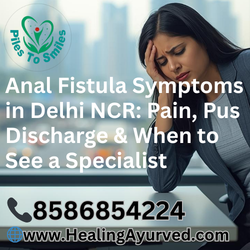
 Go to Emergency (ER) If:
Go to Emergency (ER) If: Book a Specialist this Week If:
Book a Specialist this Week If: Complex Case Monitoring (Requires Specialist)
Complex Case Monitoring (Requires Specialist)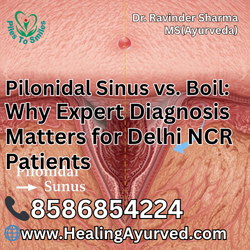

 No “Guaranteed Cure in 3 Days.” Complete and durable healing takes time, especially for high-grade or chronic disease. Our focus is on long-term relief, not instant fixes.
No “Guaranteed Cure in 3 Days.” Complete and durable healing takes time, especially for high-grade or chronic disease. Our focus is on long-term relief, not instant fixes.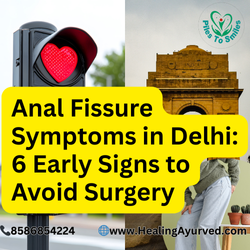


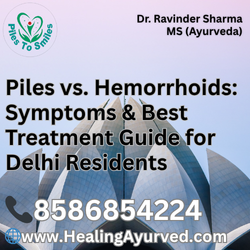
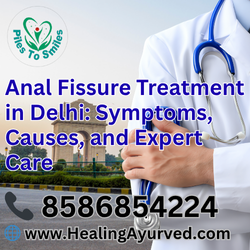
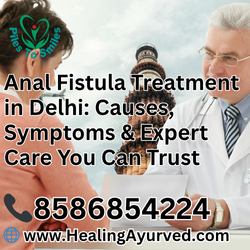
 D
D Local Authority Tip:
Local Authority Tip: 


